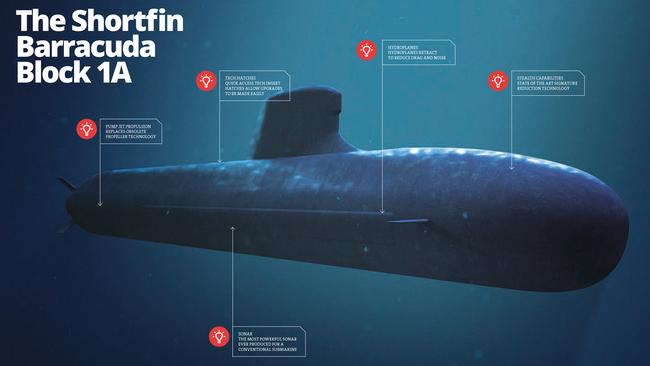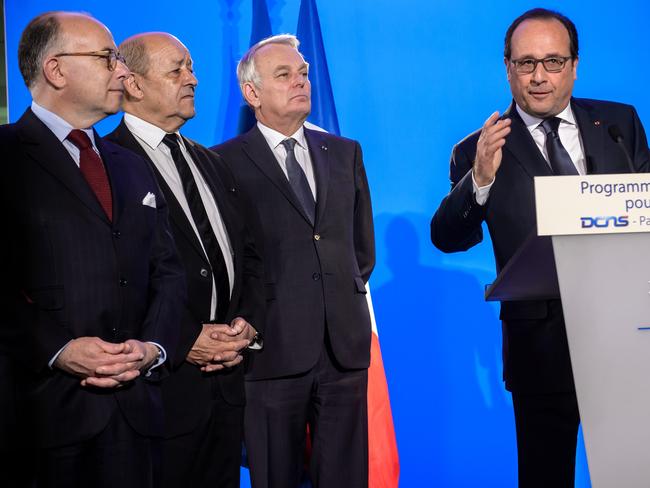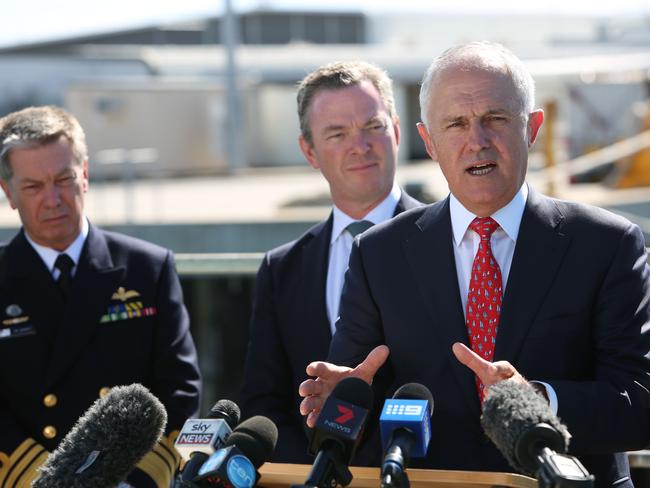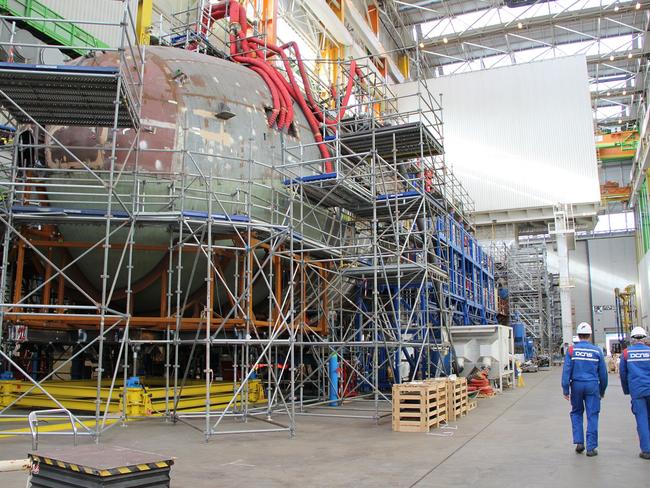Piers Akerman: Sinking feeling over unions’ $50b submarines deal
THE decision by the Turnbull government to enter exclusive negotiations with French company DCNS to design Australia’s new submarine fleet only makes a little sense if there is a secret plan.
Opinion
Don't miss out on the headlines from Opinion. Followed categories will be added to My News.
THE decision by the Turnbull government to enter exclusive negotiations with the French-government-owned and French trade union-run company DCNS to design Australia’s new submarine fleet only makes a little sense if there is a secret plan to upgrade the conventionally powered diesel-electric submarines to nuclear power at some future stage.
Otherwise, it is about as stupid as was the costly decision by the Hawke Labor government to give the socialist Swedes the contract to construct the expensive and flawed Collins-class fleet in 1987 at the Australian trade union-dominated ASC in Adelaide.
Expensively retro-fitting diesel-electric power units into a reworked version of the nuclear-powered Suffren-class submarine (now under construction for the French Navy) as the Australian government has asked, and renaming it the Shortfin Barracuda A1, has naval experts around the world shaking their heads.
The Germans and the Japanese, the unsuccessful tenderers, both make excellent conventionally-powered diesel-electrics that would have required less tweaking and would have been less expensive with greater guarantees of supply.

The French say they will deliver a bigger, faster, stronger submarine with the capacity to remain underwater for greater lengths of time — promises matched by the other tenderers, which also added one other critical ingredient: a fixed price, and, in the case of the Germans, half that of the French.
It is obvious from the enthusiastic reporting of the agreement in the French media that we are bankrolling President Francois Hollande’s election promises.
This deal is the largest weapons export agreement France has ever entered into, according to a release from the Elysée president’s office.
While Prime Minister Malcolm Turnbull and Industry, Innovation and Science Minister Christopher Pyne have both said all 12 submarines will be built in Australia, the French have announced that contract will support some 4000 jobs for DCNS and its subcontractors, with work at Brest, Cherbourg and Lorient, on France’s northwest coast.
Brest and Lorient are both in Brittany, where French Defence Minister Jean-Yves Le Drian is president of the regional council. The Australian submarine agreement cannot hurt his election prospects in a nation where unemployment hovers around 10 per cent as the 2017 general election looms.

While the French are breaking out the champagne in anticipation of the expected 4000 new jobs, Turnbull, Defence Minister Marise Payne and Pyne are crowing at the prospect of directly creating 1100 jobs, with a further 1700 in the supply chain — a total of 2800.
The French say they will reap at least $12 billion from the deal, which the Australian government admits will cost at least $50 billion.
Turnbull has said: “Let me just make it very clear, we are committed, I am committed, the government is committed to building 12 submarines, our future submarines, our future fleet, in Adelaide. This is a project, a commitment that will be continuous.”
Pyne chimed in: “Today’s announcement of 12 submarines, an Australian build, with Australian jobs, using Australian steel, secures Osborne as the centre of the defence industry for naval ship building into the future.”

Unless, of course, there is a transition to nuclear in the future, in which case they will not be built in Osborne.
The biggest flaw in the whole project is without doubt the highly unionised nature of the government-owned ASC. The company was 18 months behind delivering the first of the Collins fleet and subsequent subs were delivered between 21 and 41 months behind schedule.
A report into the hopeless effort in 1999 concluded that “the Collins class was incapable of performing at the required level for military operations”.
Remarkably, after a $1 billion “fast track” or “get well” program was instituted, the submarines began performing well in their role as stealthy patrol vessels in East Asian waters, capable of intercepting electronic communication and delivering special forces missions.
ASC’s operation, however, still cannot compare with that of the restructured Williamstown Naval Dockyard which in 1988 saw 23 union deals reduced to a single enterprise agreement, 400 work demarcations reduced to a multiskilled workplace with no demarcations, and a 600 per cent improvement in productivity within a year.

Ten Anzac frigates of German design were built at the yard in the 1990s, with production technology support from Germany, to a fixed price, with about 80 per cent Australian (and New Zealand) content to German standards of productivity and quality — arguably the most successful naval project in Australian history.
It would seem that the German bidders offered much the same deal on the planned submarines: a fixed price, efficient digitalised shipbuilding controls, about 70 per cent of Australian content and German quality and productivity levels.
The Japanese were so eager to enter the weapons export business, they would have agreed to meet anything that the others had offered.
Perhaps the only thing that can be said in favour of the arrangement with the French is that at least some decision has actually been made.
Labor was paralysed for years, the Abbott-Turnbull government pushed for a resolution.
What can be said is that the French know how to milk Australian politics better than most Australian politicians.
The idle but expensive desalination plants we bought from the French are now joined by their submarines as testimony to their diplomatic skill at extracting taxpayers’ money from Australian politicians.



